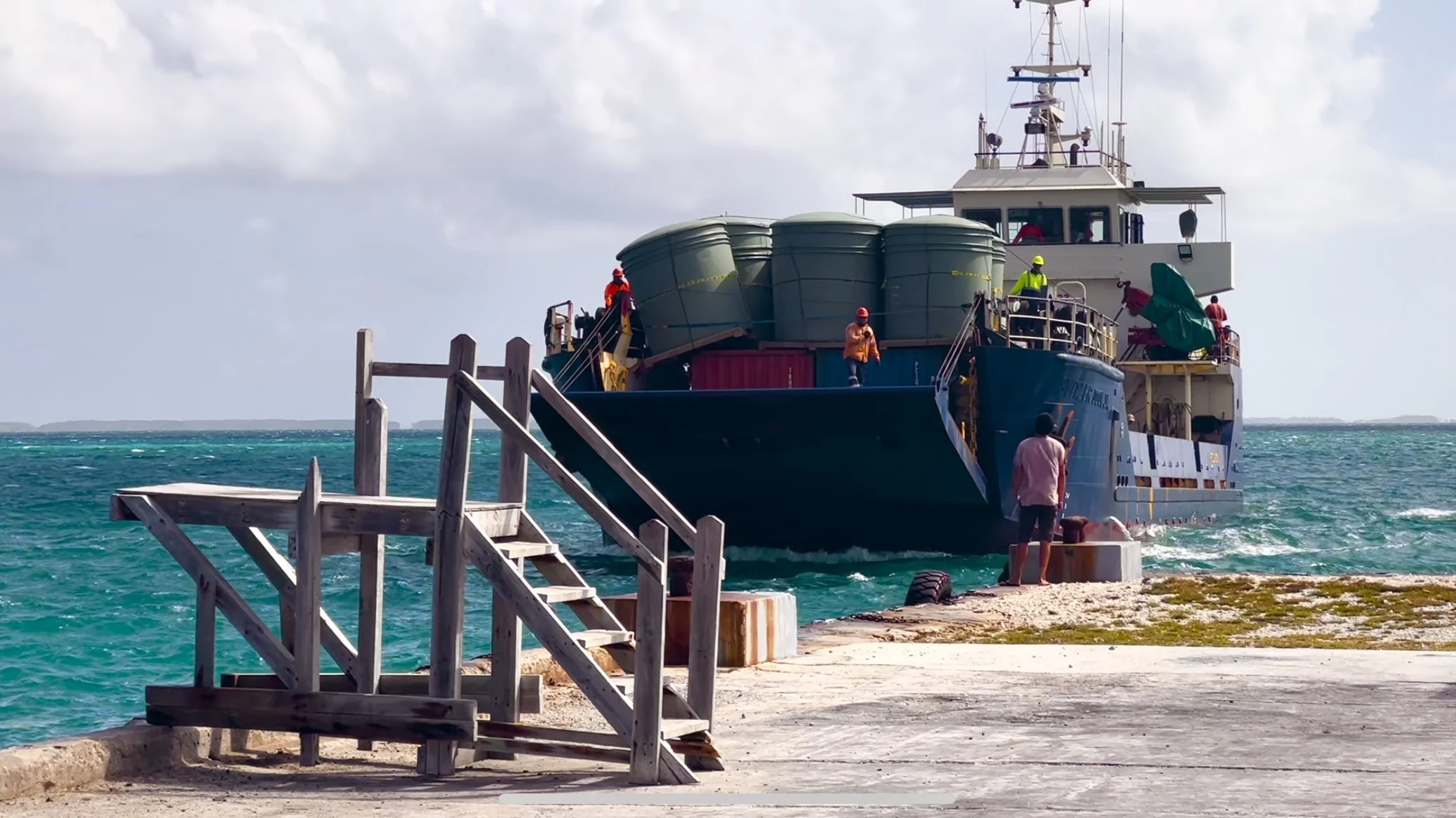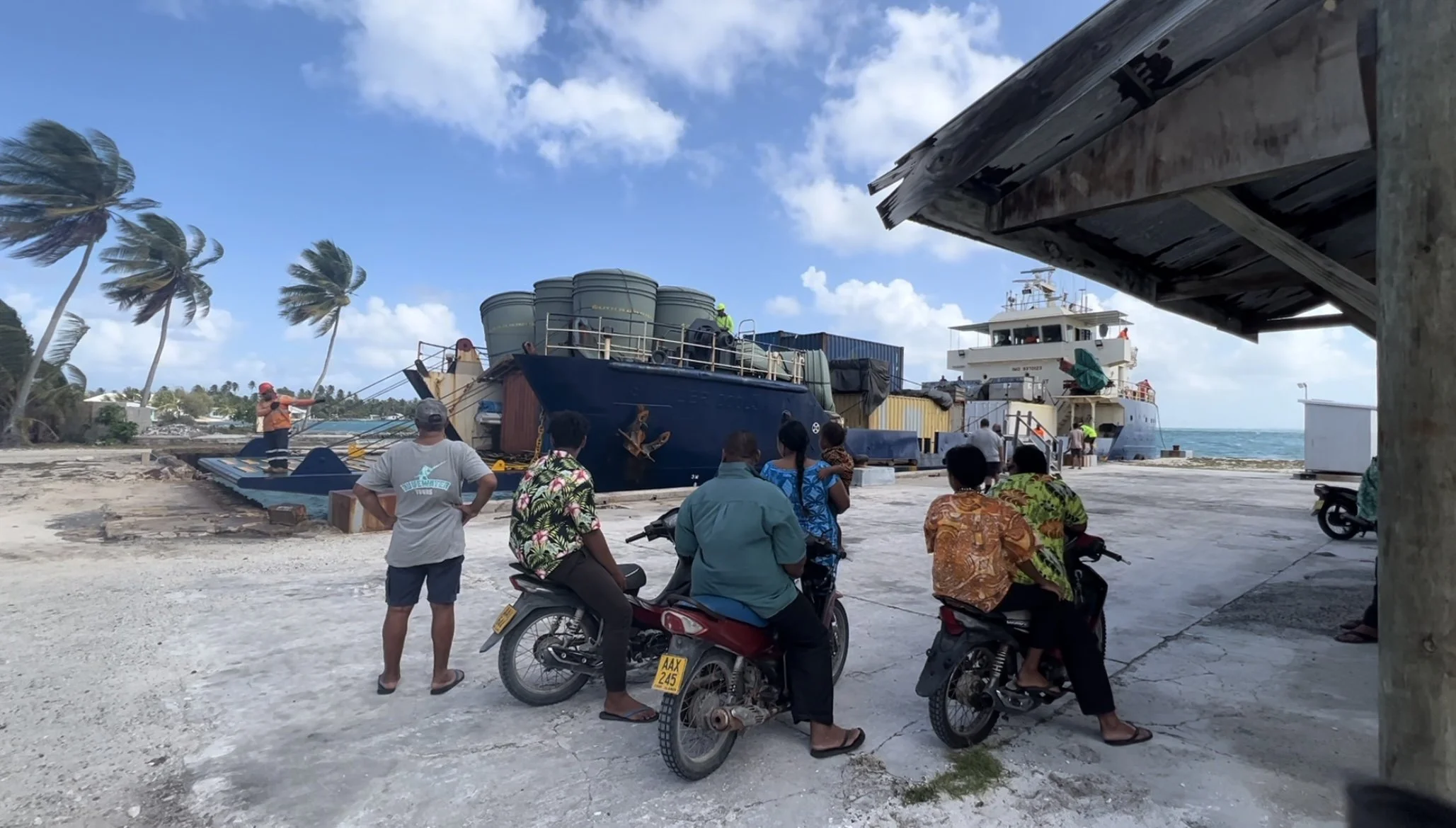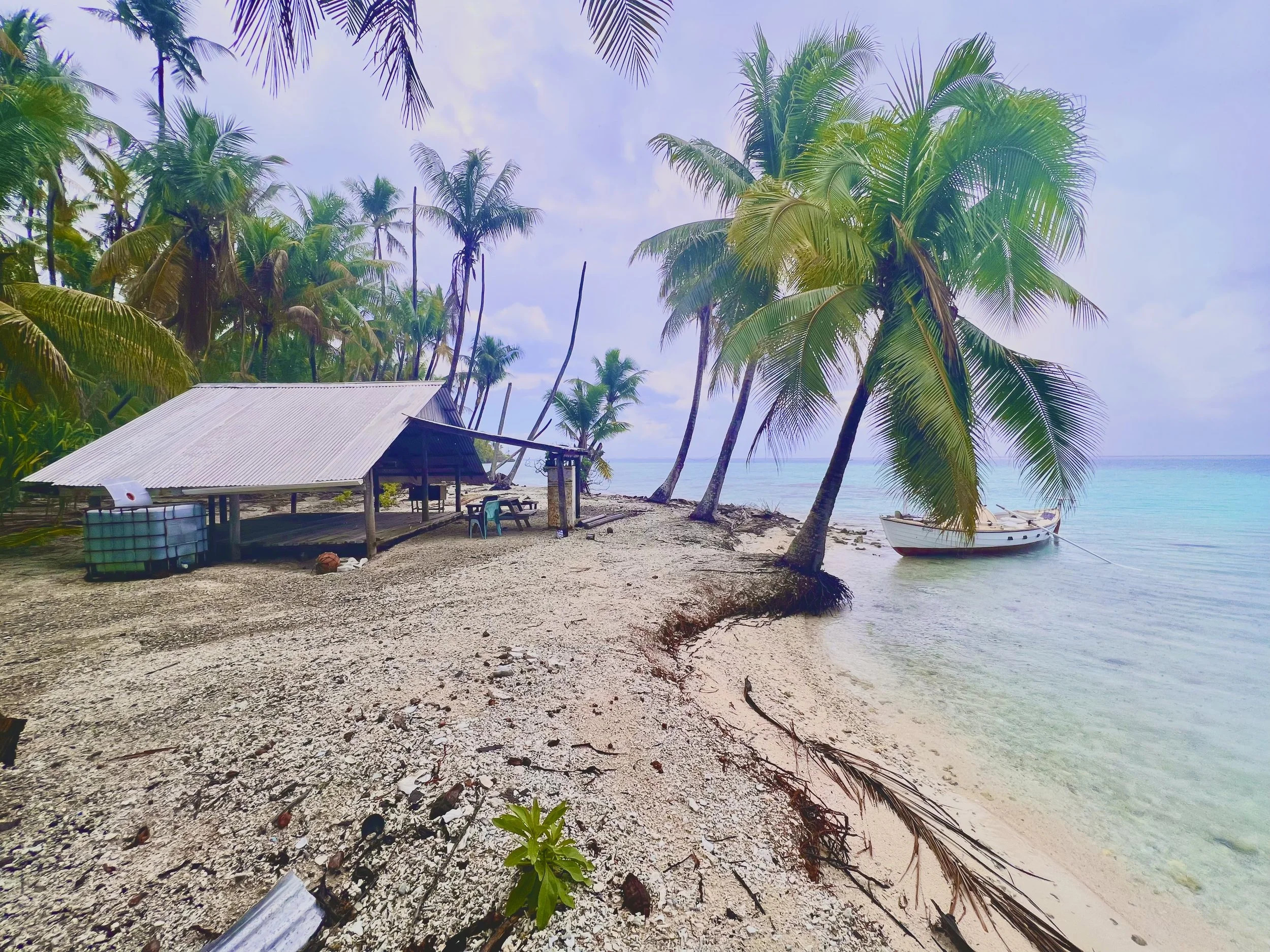The Ship Arrives - My Departure Awaits
Every three months, sometimes less, sometimes more, a new day dawns on Tongareva, and there’s a sense in the air that it’s going to be a good day. The day the ship arrives. People of the city are perhaps unaware that they too rely on the ship arriving, as it is no less important to their survival than to the people of Penrhyn, but as is the case with much of city life, it’s a rather impersonal event that is for the most part out of sight and mind. We pay somebody else to tie up the boat, another to unload the cargo, yet another to deliver it to the shop, then perhaps another to make it into a meal for us to purchase; to sit down and eat at a fast food restaurant. We are free to ponder as we eat, we may ponder many things, but probably not the ship that brought the ingredients from across the seas. The people of Penrhyn will never be guilty of such insincerity and privilege - the coming of the boat is a blessing appreciated by all.
The arrival of the latest ship was perhaps more welcome than others in the past. You see, much of the island had run out of food. Not many families had any rice left, communal feasts had been put on hold, and the shelves of the ‘shop’ were gathering a layer of dust. A lack of rice may not seem like a big deal for many, but on Penrhyn, and indeed many other parts of the world, rice is an important staple. Every day here it’s fish and rice for breakfast, lunch and dinner, and if one gets bored of fish and rice, then they are more than welcome to try the alternative of rice and fish. Since the rice had run out, people had been helping themselves to the handful of communal breadfruit trees around the village, and going on expeditions to gather ‘uto’ - matured, sprouting, coconuts with a white, spongy meal inside. Uto is commonly grated to produce a rice like substance, but, due to a serious lack of rain, there has not much uto at all, and the breadfruit supply was dwindling. The day the ship finally arrived was going to be a good day.
I was in the village on the eastern side of the lagoon on Sunday. It had been a typical hot, quiet and devout Sunday, but this time with the anticipation that the boat would be arriving that evening. After the sun had set, and the sabbath ended, much of the village got together to pack frozen fish into old sugar bags for delivery to their families in Rarotonga; I was wiring plywood name tags onto the sacks. Due to a shortage of freezer space on the island, these sacks would make the eight mile journey across the lagoon the next day, but only once the freezers on the ship were ready to be loaded, hopefully in the cooler afternoon. While we were working away, someone spotted the masthead light of the ship as it neared the outside reef on the western side of the lagoon, excitement grew. There the ship would stay until the next day when the pilot would be taken out in a small boat to helm the ship through the dangerous pass and around the coral heads in the lagoon. It would be terribly disrespectful for the ship to enter on a Sunday.
The next morning in Omoka there was something in the air, was it anticipation or excitement? Whatever it was, it was quite subtle. It’s not in the nature of a Penrhyn to get excitable, they are a cool lot. I made my way down to the wharf on my bicycle, and there she was; the big, blue, steel-hulled ship, lying alongside the wharf, generators humming. Much of the village was sitting around on chairs and under trees, each window of the school house was filled to the brim with bright, young faces peeking out. That night they would be having rice and ice-cream for dinner. Every man in the village worth his salt, which is every man, had donned a high-visibility shirt, vest, or sometimes both, and were beginning to unload their cargoes with the assistance of a bobcat, loader and the eight Fijians who make up the crew of the ship. A marquee had been set up, and there was a table with water jugs at the ready, it was all very well organised. As I sat with my back against a coconut tree, my bare feet on the grass and my knees up, I watched little bits of my breakfast fall to the ground. Before long they appeared - the ants. Like a silent army they began swarming around each crumb as it miraculously fell from the sky and into their world. With order and efficiency the crumbs were broken up and carted away. For a minute, or was it five, I was engrossed, studying their every move, the way they bumped heads, touched feelers and communicated instructions to each other, no step was made unnecessarily, there was work to be done and efficiency was the order of the day. I was startled from my diorama by the sound of the first pallet load of flour landing on the grass ahead. I looked up. Every man in the village swarmed around the first pallet and began to unpack the sacks; they were divided, sorted, then carted away. The ants had their world under my coconut tree, and here on Penrhyn was another world, a diorama for the Man above. The ship had arrived and it was a blessing.
All day the village worked, unloading everything imaginable for a settlement. There were building materials, outboard motors, bicycles and motorbikes, freezers, mattresses, and sacks of rice, flour and sugar - the essentials. There was no furniture unloaded, if needed, it would be made from the pallets and packing cases that held the sacks of rice. Nobody on the island ever knows when their specific bags of rice, flour and sugar will be unloaded, hence they must stay put, close by, all day, at the ready. The most notable arrival was that of a wooden box, on it was stickered a picture of a large and complex looking dome as well as the words SWITZERLAND written next to THIS WAY UP. The arrival of this device means that there will soon be internet to the entire island, 3G has arrived. Perhaps this was important, but the most excitement came with the unloading of the refrigerated containers: cardboard boxes of beef and chicken were set ashore, and then came the ice-cream. A sensation is almost unheard of on Penrhyn, but the closest thing I’ve seen so far is the unloading of the ice-cream, a treat universally loved amongst the village. If one wishes to entertain the idea of moving to paradise and making a career change, I would heartily recommend considering ‘Ice-cream truck operator of Omoka’ as a new career.
The day wore on, yet by the afternoon there was still much to be done. By now most of the village had gathered their orders, some things didn’t arrive as they should have, which usually happens, but all in all everyone was feeling pretty good, they would have milk powder in their coffee that night as they ate a big bowl of rice. Sheer luxury. As the unloading finished, the loading began. Tongareva has little in the way of exports, but there were still many sacks of fish to load, as well as huge bundles of rito (young coconut fronds) to be sent to Penrhyn women in Rarotonga to weave into church hats. It took three or four strong men to lift these bundles onto their shoulders and carry them to the barge, where they were manhandled to another four big Fijians on the hardwood deck of the ship. “Ayyyy, this must be the whole coconut tree” said one of the Fijian crew as he compressed under the weight of the load; everyone erupted in laughter. I found the captain amongst the crew helping with the loading. I had met him four months previously, just after I arrived, the last time the ship came. This was my chance to have a proper conversation with an outsider, a pleasure I had only had twice in my time on Penrhyn. He was a tall and broad young Fijian man, singlet clad, with a slight Indian inflection to his accent. I asked him endless questions about the ship and the operation, about the other islands in the Cooks. Like a child who had never left their island home I asked him about Rarotonga and Suva, about cars and ships and bars and clubs, shipyards and slipways, supermarkets and convenience stores. He told me of his home in Fiji, an island known as ‘the garden’, where anything and everything grows, where there are lots of jobs, fantastic timber and daily flights to the main island. My eyes were just about popping out of their sockets. He laughed at the ‘uto’ that had been bought from Rakahanga - Penrhyn’s closest neighbour, 200 miles away - I gather that on his island uto is pretty low down on the list of agreeable foods, yet on Penrhyn we don’t even get enough of it to go around. A hardy existence indeed.
My dreams often come true. That day I had been dreaming about being invited onboard for dinner with the crew. I knew I was in with a good chance when the captain invited me onboard for an informal tour, a friendly and natural gesture after the copious questions I had been asking. I thought of that old story of the coke bottle being dropped out of a plane and landing among an untouched tribe in the Kalahari desert. For those people it was new and interesting and exciting, a major change in their otherwise unchanged world. This ship was my coke bottle, and I wanted to know every detail. We went from the bridge to the crew quarters, the galley to the after deck, up companionways and down scuttles, into the humming, hot engine room, through the belly of the ship and right up forward to her very eyes; the deafening clanging of cargo on the deck above. I soaked it all in, asking every imaginable question to quell my curiosity about every nook and cranny, every dial and knob of this alien spaceship in my otherwise natural world. We went to the crew mess; there were a couple of guys sitting around, taking a well-earned break from a hard day. They knew all about me before I knew them, and so we chatted away pleasantly, swapping stories of the sea. There was an older woman there, she was heading to Rarotonga from her home in Rakahanga, eventually, perhaps weeks after leaving her home, she would arrive in Sydney to visit her daughter. She looked at me, surprised at the stories I was telling. “Oh, I thought you were a local”, she said casually. I couldn’t help but smile.
Young Bill, one of the engineers, expressed interest in going ashore for a walk; I told him we’d go together, I’d be his tour guide. The sun had well and truly set as we leapt ashore in the darkness. The boat from the other village had just arrived with the sacks of fish, ready to be unloaded from one boat and reloaded onto the other. The powerful fluorescent lights of the ship were beaming down on the evening operation. I explained to Bill that I didn’t have a motorbike, but that we would be fine walking. I showed Bill the bank and the police station “Oh, it’s very small” he said with a smile. I showed him my accomodation and the hats and necklaces I had been gifted. I offered him a handful of pistachios, leftovers from Peru. He said he’d never tried them before but had seen them once on a super yacht he was working on, as well as in the movies. We both agreed they tasted alright. We kept walking past the waterfront to the Sunday School and the Craft Centre, “Do you notice how quiet it is here, Bill?” I remarked. There really was not a sound, no cars or bikes, television or music. “I did notice”, he said softly. As we walked towards the church, the only real point of interest in the village, I told him of my Penrhyn name, that to the people here I was Mahutahoehoeasanga, that everyone had been good and kind to me. “That’s a strong name, bro. You’re like a local here”, he said. I smiled. I told him about our church, the singing and the Sundays. “Fiji was like that a long time ago” he remarked. We kept walking. Of course, we stopped at houses along the way, I wanted to introduce my friends to Bill and Bill to my friends. We were invited to sit down and chat, and we even got a cup of soft drink each - it had been months since anyone on the island had enjoyed a fizzy drink. Bill had to be back at the ship for an engine room check, so we kept walking, less than a minute later we rounded a corner and we could see lights of the ship at the wharf. “Oh wow, it’s very small here”, he said. It took me a minute to respond. It finally dawned on me, we had just seen most of my whole world in the space of fifteen minutes, and in a second Bill had put it into perspective. The walls of coconut trees began to close in around me, I felt like a lone seal on a melting iceberg. My whole world had been so small yet felt so big, and with one remark it had all changed.
We got back to the wharf and greeted the few crew who were still working. It was time for dinner and I had been invited. Dreams come true. The captain showed me to the pot of rice and the pot of chicken curry. I knew it was going to be good. After helping myself to a hearty serving I stepped through into the mess and put my bowl on the table. I enquired about cutlery, which I was told was in the drawer behind me. I knew the drill, and lifted the drawer to unlock it before sliding it out. It was a proper ship's drawer; no instructions needed, the crew were impressed. As I rummaged around for a fork, my mind replied to their look of surprise with my best piratical tone “Ayy me hearties, you don’t take me for a landlubber now do ye?”.
I sat down and began to eat. I asked about the islands and reefs of Fiji, taking careful mental notes of what was said, explaining my intended departure in a week or two. Just then, the Penrhyn who piloted the ship walked into the mess, he gave a knowing look with a mischievous smile aimed directly at me, as, if there’s a free meal going on the island, somehow I always manage to sniff it out first. It had been a long time, over nine months, since I had tasted food like that curry; compliments to the cook, who for legal reasons is taken on as ‘passenger’ for all their voyages. We sat at the table, eating good food and talking about engineering, politics, seamanship, and anything else that took our fancy. My Penrhyn friend emerged from the galley and sat down next to me. He was shown to the cutlery but shrugged it off and began to eat with five fingers. The engineer looked at me and raised his eyebrows. It took me a millisecond to appreciate what he was saying, I returned the expression with a diplomatic look.
I went back to my meal and dreamt of this land called Fiji where the food grows on trees and couples go to the movies on a Saturday night; a land with three daily newspapers and a rich history. A place with a museum and a library, colonial architecture; all those things. And at that moment I realised it was time for me to continue my journey, to keep rowing, to keep exploring. Perhaps there will be no pasture as green as Penrhyn, but I simply must find out for myself.
The next leg of my adventure will commence on Friday the 14th of April at 10:00 am local time (20:00 UTC). The day I depart paradise.


